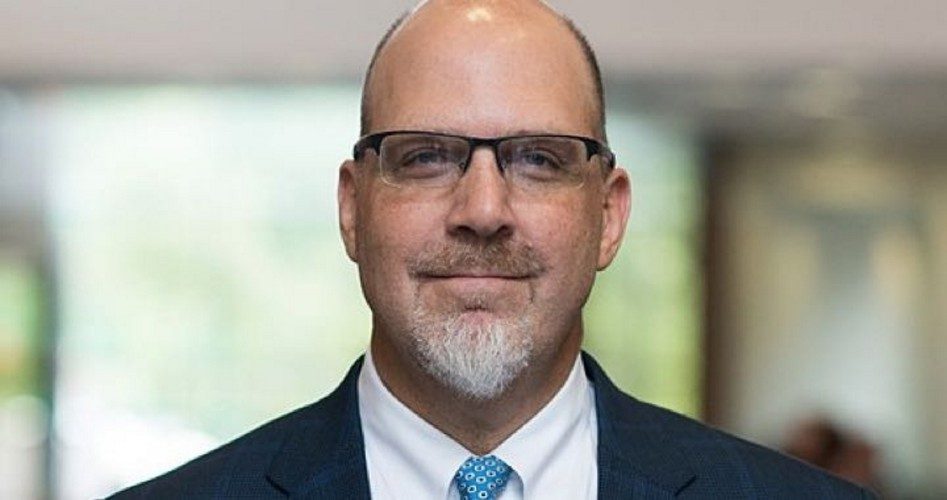
Stephen Parente (shown), President Donald Trump’s nominee for assistant secretary of planning and evaluation in the Department of Health and Human Services (HHS), is closely linked to major health-insurance companies — evidence that the revolving door between regulators and the industries they regulate continues to spin.
If confirmed, Parente, who was nominated in April, would become the “principal advisor” to the HHS secretary on policy development, according to the department’s website. The office he has been nominated to head “is currently researching the impact of Obamacare on the insurance market,” wrote Politico.
There is little doubt that Parente is knowledgeable on such matters. The 52-year-old economist, who specializes in healthcare finance, holds the Minnesota Insurance Industry Endowed chair at the University of Minnesota. In 2006, he founded the university’s Medical Industry Leadership Institute (MILI), which connects academics with industry leaders and researches industry problems, and served as its director until his nomination by Trump. He has also served as chairman of the Health Care Cost Institute and operated a private consulting business whose clients include UnitedHealth Group, the nation’s largest health insurer, and other healthcare organizations.
All this involves big bucks from Big Insurance. Both Parente’s academic chair and the Health Care Cost Institute are directly funded by insurers, and MILI has been the recipient of numerous gifts from insurers over the years, including $1 million over five years from UnitedHealth.
UnitedHealth’s latest contribution to the center has raised some eyebrows. Five months after Parente’s nomination, the insurance giant bestowed a three-year, $1.2 million grant on MILI. “Neither the university nor UnitedHealth has publicly announced it, as they have with previous grants,” noted Politico. The university applied for the grant in early 2016, and both it and UnitedHealth insist the award had nothing to do with Parente’s potential position in Washington.
Given Parente’s close ties to the insurance industry, would he be able to conduct his HHS work in an evenhanded fashion? That mostly depends on one’s position on ObamaCare. Parente has been critical of the 2010 healthcare law, claiming — with good reason — that it is too expensive and will lead to an insurance death spiral. Thus, ObamaCare supporters tend to fear that Parente will recommend changing ObamaCare regulations in ways that will benefit insurers, while opponents consider his industry-insider status a plus.
“I absolutely think there’s a concern here,” insurance executive-turned-critic Wendell Potter told Politico. “I would imagine that he would certainly have a bias toward the current model of health insurers,” he added.
By contrast, Michael O’Grady, who held the post for which Parente has been nominated under President George W. Bush, told Politico that Parente’s connections to the insurance industry are an “advantage,” explaining, “If you’re going to negotiate with them, you want to know them, and how they think, and will they take the deal.”
Parente wouldn’t be the first UnitedHealth ally to wind up in charge of ObamaCare policy. In 2015, President Barack Obama appointed former UnitedHealth executive Andrew Slavitt as acting administrator of the Centers for Medicare and Medicaid Services (CMS) — and gave him an ethics waiver so he could immediately begin to make policy that would affect his former employer. When Obama nominated Slavitt as the permanent CMS head, ObamaCare opponents argued that Slavitt’s conflicts of interest made him unfit for duty, but since Senate Republicans never brought him up for a confirmation vote, he was allowed to remain in his position through the remainder of Obama’s term.
Parente, if confirmed, may well turn out to be a fairly unbiased policy adviser, but the problems that he represents will still exist.
Problem number one: It is impossible for any one man, or even a small group of people, to centrally plan the healthcare of over 300 million Americans, as economist Friedrich Hayek demonstrated.
Problem number two: As long as the federal government insists on micromanaging private industry, industry will have every incentive to pack regulatory agencies with its allies, a phenomenon known as regulatory capture.
The solution to the conundrums represented by Parente, Slavitt, and so many others is to drastically scale back Uncle Sam’s power, using the Constitution as a guide. A government that does not control business will not be controlled by business.
Photo of Stephen Parente: wikipedia



